Canadians Are Ready for Paramedics to Do More in Healthcare: Abacus Data Poll
June 8, 2023
On behalf of the Paramedic Association of Canada, Abacus Data conducted an extensive online nationwide survey of Canadians’ views of healthcare and the role of paramedics. The sample size was 3,150 adult Canadians and the survey was conducted from April 24 to 28, 2023.
The full report can also be accessed in French HERE.
Many More Canadians Think Emergency Room Wait Times, Access to a Family Doctor, and Paramedic Response Times are a Major Problem in Canada.
Since 2021, concerns about several aspects of Canada’s healthcare system have increased. Today, half or more Canadians believe that emergency room wait times and capacity (66%), surgery wait times (63%), hospital overcrowding (59%), access to a family doctor (56%), and access to mental health services (50%) are a major problem in Canada. Those who believe emergency room wait times are a major problem increased by 13 points since 2021 while those who think access to a family doctor is a major problem is up by 16 points.
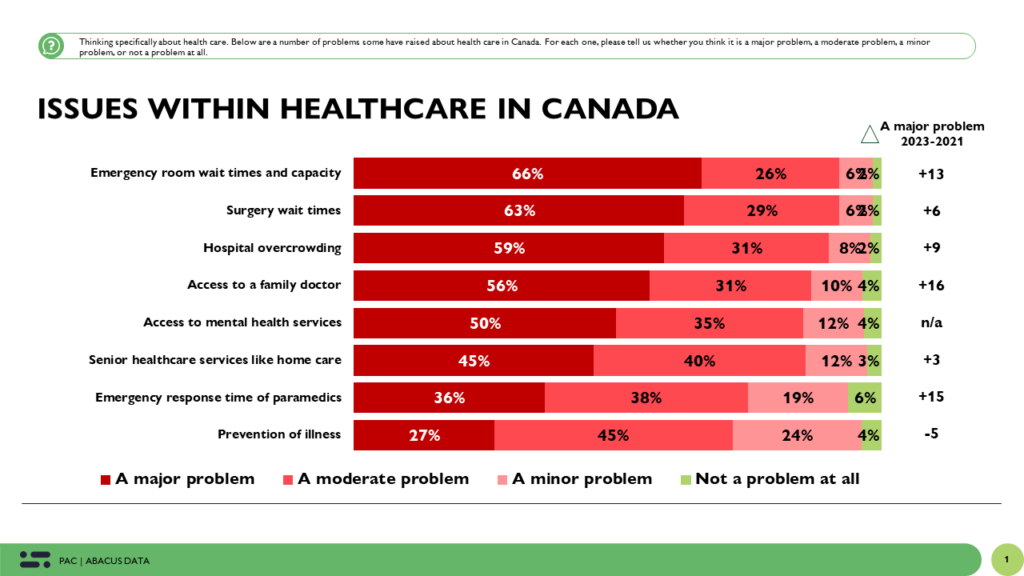
When it comes to response times of paramedics, 36% believe it is a major problem, a 15-point increase since 2021 and a 23-point increase since 2012. Back in 2012, only 13% of Canadians considered paramedic response times are a major problem.
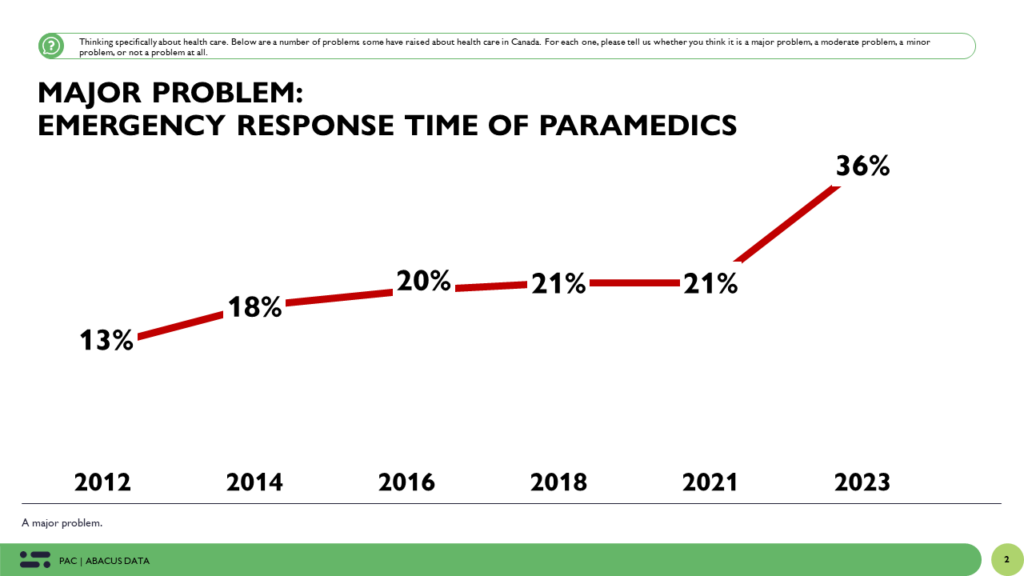
Regionally, views about paramedic response times are fairly consistent although those in BC (46%) and Alberta (39%) are more likely to consider it a major problem than those in other provinces.
The survey also found that older Canadians are more likely to think the health care issues identified were serious problems in Canada. In particular, 66% of those aged 60 and over believed that surgery wait times were a major problem, 25 points higher than those aged 18 to 29.
Paramedics are Deeply Respected and Most Believe they are Central to the Healthcare System.
89% of Canadians say they have a lot of respect or considerable respect for paramedics. This view is held across the country and demographic groups.
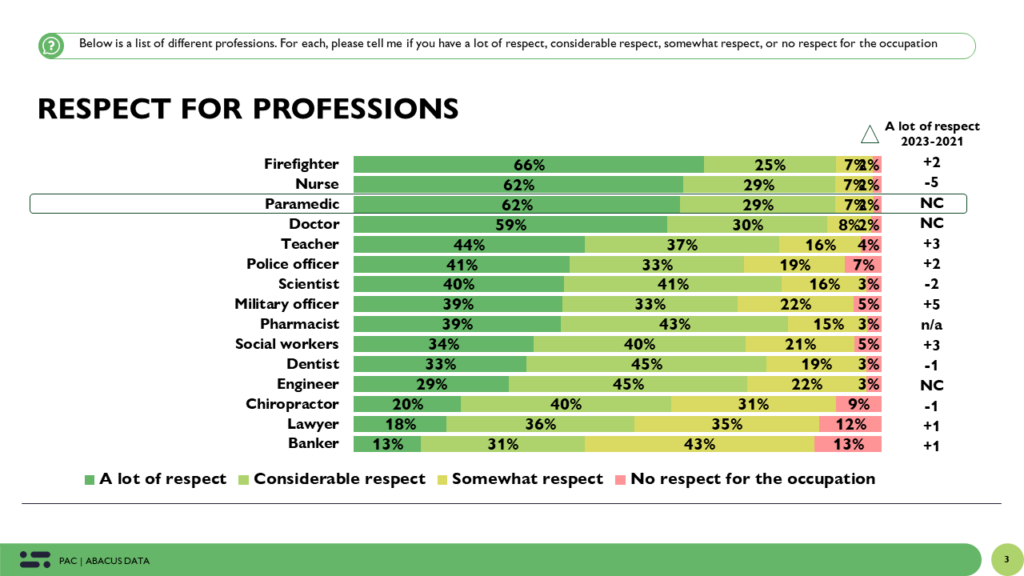
When asked to classify whether several professions played a central role, an important role, or a supporting role in the healthcare system, 57% think paramedics play a central role while another 32% say an important role. This is unchanged from last year.
Overall, 74% of Canadians believed that doctors play a central role followed by registered nurses (64%) and paramedics (57%).
The views about paramedics are consistent across the country although older Canadians and those who have been treated by a paramedic were more likely to consider paramedics central to the healthcare system.
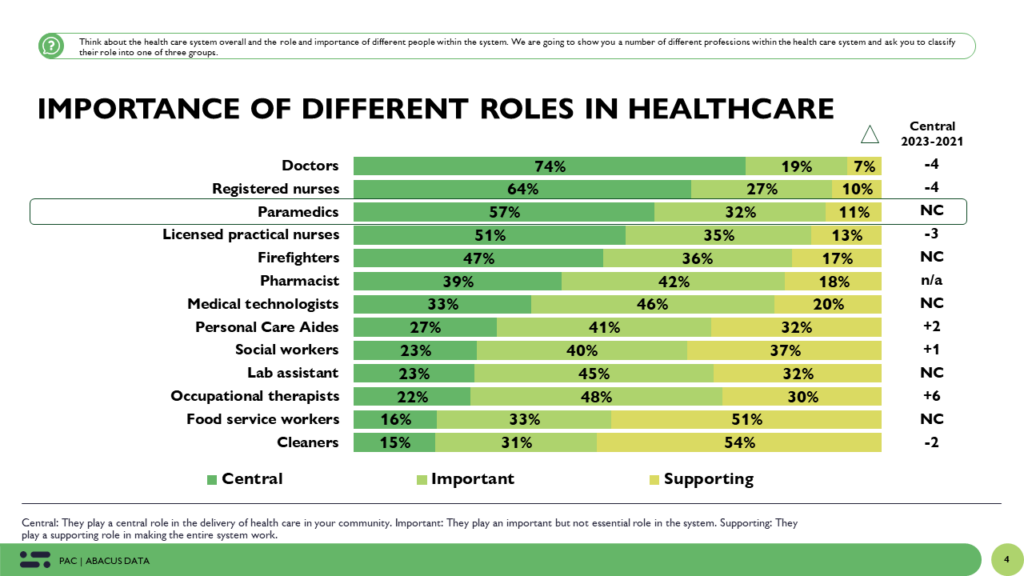
Paramedics are as trusted as doctors or nurses to make on-the-spot medical decisions.
When asked to what extent they trust doctors, nurses, and paramedics to make on-the-spot medical decisions about their personal health, eight in ten (82%) Canadians said they had high trust in paramedics compared with 81% for nurses and 85% for doctors.
Trust in paramedics was consistent right across the country and across demographics. 87% of those who have personally been treated or transported to a hospital by a paramedic say they have high trust in their ability to make on-the-spot medical decisions.

83% of Canadians support the idea of Community Paramedicine.
Respondents were shown the following description of community paramedicine and asked whether they support or oppose the idea of community paramedicine:
Traditionally, paramedics are trained to respond to emergency 911 calls, treat patients who are ill and/or injured, and transport patients to emergency departments. However, not all patients require transportation to an emergency department. Many simply need a basic health assessment, minor treatment, and referral to an appropriate community, or other health care service.
Community Paramedicine is about engaging paramedics in non-traditional roles to assist in delivering health care to urgent and non-urgent, but not life threatening situations. By expanding the role of paramedics, and working collaboratively with other health care professionals and community agencies, paramedics can manage patients who do not require immediate treatment and transportation to an emergency department.
Under a Community Paramedicine model, paramedics will continue to respond to medical emergencies and provide non-urgent medical care within the community and at patients’ homes.
Overall, 83% of Canadians we surveyed either strongly support (44%) or somewhat support (39%) the idea of community paramedicine as presented in the survey. Only 2% are opposed to it and the remaining 15% said they neither support nor oppose it.
Support for the idea is consistent across the country and is particularly popular among women – 47% of whom strongly support the idea of community paramedicine.
There is also cross partisan support for the idea – Liberal, Conservative, and NDP supporters overwhelmingly support it.
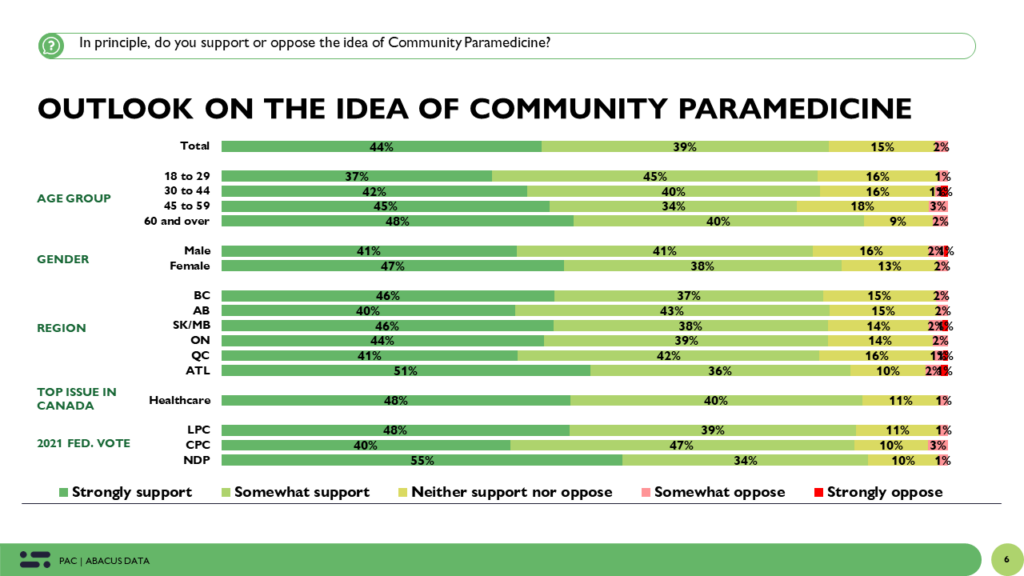
Why is there such high support for community paramedics?
Almost all Canadians are comfortable with the idea of paramedics playing a greater role in the delivery of healthcare services in their community. 93% say they are either completely or mostly comfortable with the idea including massive majorities across age, gender, and regional subgroups.
At a time when Canadians are deeply concerned about the capacity of the healthcare system and whether they can get access to care when they need it, Canadians believe paramedics can be utilized more.
In fact, when we ask whether people consider paramedics to be either emergency responders, healthcare professionals, or both, 70% consider them to be either healthcare providers alone or both healthcare providers and emergency responders equally. The perception of the profession has changed as the nature of healthcare and Canada’s healthcare system has changed.
In fact, when we present respondents with a scenario in which a paramedic responds to a medical emergency and give Canadians a choice between that paramedic always taking them to a hospital, no matter what the medical problem is or allowing the paramedic to decide whether there is a more effective option for treatment, 2 in 3 give the paramedic discretion to make the right choice. Only 22% want the paramedic to take them to the hospital.
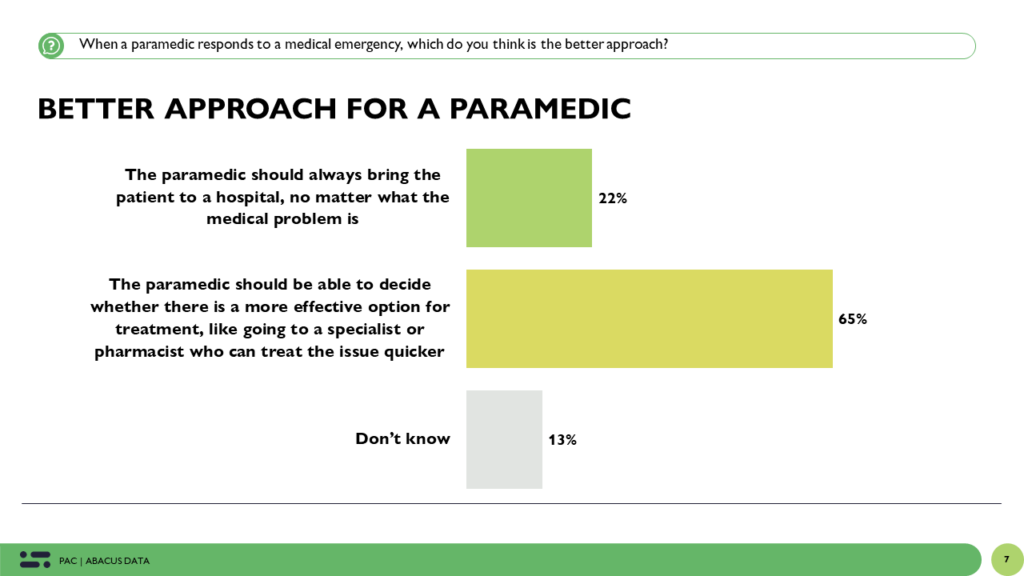
The Upshot
Health care remains a top concern for many Canadians, especially as it relates to capacity and access issues in emergency rooms, hospitals, and access to a family doctor. More recently, concerns about the emergency response times of paramedics have also grown sharply. Given these concerns, Canadians recognize and value the role that paramedics can play in improving access and outcomes for Canadian patients.
Paramedics in Canada are well regarded, trusted, and seen as central to the health care system. There is almost no resistance to the concept of community paramedicine and large numbers of Canadians enthusiastically support it, especially women who value the peace of mind knowing that their loved ones will be cared for if a medical emergency or situation arises.
Given the reputation of the process and the role Canadians see paramedics playing, it should be no surprise that the public thinks they should be part of the national discussion about the future of healthcare and play a greater role in delivering healthcare services.
Methodology
The survey, commissioned by the Paramedic Association of Canada, was conducted online with 3,150 Canadians aged 18 and over from April 24 to 28, 2023.
A random sample of panelists were invited to complete the survey from a set of partner panels based on the Lucid exchange platform. These partners are typically double opt-in survey panels, blended to manage out potential skews in the data from a single source.
The margin of error for a comparable probability-based random sample of the same size is +/- 1.8%, 19 times out of 20.
The data were weighted according to census data to ensure that the sample matched Alberta’s population according to age, gender, educational attainment, and region. Totals may not add up to 100 due to rounding.
Paramedic Association of Canada
The Paramedic Association of Canada is a voluntary professional organization of paramedicine practitioners in Canada. Its mission is to provide quality care for the public through leadership in the advancement of the profession of paramedicine. For more information, contact Pierre Poirier at pierre.poirier@paramedic.ca, or visit their website at http://www.paramedic.ca/
ABOUT ABACUS DATA
We are the only research and strategy firm that helps organizations respond to the disruptive risks and opportunities in a world where demographics and technology are changing more quickly than ever.
We are an innovative, fast-growing public opinion and marketing research consultancy. We use the latest technology, sound science, and deep experience to generate top-flight research-based advice to our clients. We offer global research capacity with a strong focus on customer service, attention to detail, and exceptional value.
We were one of the most accurate pollsters conducting research during the 2021 Canadian election following up on our outstanding record in 2019.
Contact us with any questions.
Find out more about how we can help your organization by downloading our corporate profile and service offering.



